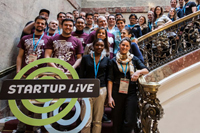The Start-ups of Tomsk

The Start-ups of Tomsk. Source: PhotoXPress
VitaVallis antimicrobial bandages
VitaVallis specializes in nano-particle bandages that help heal infected, chronic, post-operative, and burn wounds. Two million people die every year from hospital infections in Russia, and many bacteria and viruses are becoming more resistant to treatment. VitaVallis bandages use electrostatic interaction to sterilise injuries as a safe alternative to antibiotics and chemicals.
Each bandage contains active sorption centres, which use positively charged particles to attract negatively charged contaminants. Effectively, the dressings act as magnets to clear harmful micro-organisms from a wound and keep them contained inside the bandage. They have been proven to reduce treatment time up to 1.5 times faster than antibiotics.
Not only do they speed up healing, VitaVallis dressings are non-allergenic and
minimize scarring. They can treat even infected second- and third-degree burns
while eliminating the need for skin grafts.
“We sell our product directly through the customers – the pharmacies – not
through the hospitals,” Andrei Inozemtsev, sales director for VitaVallis, told
The Moscow News. “Right now, they’re sold in about 20 regions. The Russian
market capacity is about 30 million to 40 million of these dressings annually,
and we hope to take about 10 percent of that in the next year and a half.”
VitaVallis has been certified by the Federal Service for Supervision of
Healthcare, and is a resident of Tomsk’s special economic zone (SEZ). It is
currently expanding its product line to include everyday household dressings.
Krasota SM
Healthy eating is a trend that hasn’t exactly caught on in Russia, but Krasota is trying hard to make it happen. This company, established in 1992, uses fresh berries, fruits and vegetables from local sources in Siberia and Altai to produce over 300 types of juices, tea and other edible products. The organization’s motto, “Красота. Сила. Молодость.” (Beauty. Strength. Youth.), verbalises their focus on eating healthily to resist disease and improve overall quality of life.
Krasota mainly specializes in juices and nectars, which are available with or
without sugar, fructose and pulp. They come in recyclable glass bottles ranging
in size from 0.25 litres to 3 litres, and do not contain any additives or
preservatives. The company also offers a wide range of healthy jams, syrups,
toppings, ketchup, and sauces.
“Micronutrient deficiency, the spread of obesity and other metabolic diseases –
these are not just problems for health workers, but for everyone,” said Vera
Tarasova, director of Krasota SM. “When you periodically cleanse your body of
toxins, you strengthen your immune system, control your weight and improve your
overall quality of life.”
Krasota runs its own health food centre, which provides consultation and
assistance to promote a healthy lifestyle. Its dieticians work with individuals
to increase vitamin intake, supplemented partly by Krasota’s natural,
ecologically pure food products. They’ve won more than 30 medals and diplomas
for their products, which are available all over Russia.
Sektar
Jaded as most of us are by the wonders of modern technology, the occasional flashy gadget still has the capacity to make us gasp and marvel, “How does it do that?” Sektar’s augmented reality (AR) program is one of those. Using 3D models, AR creates a visual, computer-based complement to real-world virtual data.
On a computer, the user designs a 3D model of an image they want to be
displayed later: a house, a car, a dog – anything. The user then prints out a
flat label, which has a specific marker containing all the virtual data about
the image. When this label is held up in front of the camera of a computer or
mobile phone, the AR application recognizes the marker and displays the full 3D
image on the screen instead. The picture moves in real time: any shifts or
rotations of the label are mirrored by the image on the screen. As a result,
what appears to be a black check mark on a piece of paper can suddenly
transform into a full-blown 3D scaly green dragon whose wings flap gently as
the user tilts the paper back and forth.
Entertaining, yes, but AR also has a number of real-world applications.
“You can apply this technology to advertisements, making them more interesting
to lure people in,” said Alexander Beller, Sektar’s general director.
“Technology now is so dynamic and colorful that it can leave a really positive
effect on people.”
The 3D images rendered by AR programs have been used in advertising, gaming,
medicine, e-education, satellite navigation, and even the automotive and defence
industries.
Partner-Tomsk Wood Processing
This company is one of the leaders of the Tomsk timber industry and the largest
lumber production plant in the Siberian Federal District. It uses
advanced-technology equipment from a German company, Dieffenbacher, to produce
and laminate medium-density fibreboard (MDF). The plant also contains a
generating station that transforms energy waste into heat; it’s the only one of
its kind in the Russian wood-processing industry.
The MDF panels are produced by mixing and hot-pressing dried wood pulp with
synthetic binders and lignin, an organic compound found in heated wood. The
boards are then polished and laminated. All the timber is cut locally from
forests in the Tomsk region, and since Partner-Tomsk doesn’t use any harmful
epoxy resins or phenol, their product is considered environmentally friendly.
The company produces 800 cubic metres of MDF per day (264,000 cubic metres a
year), and ships to consumers across Russia, Central Asia and the Middle East.
First published in the Moscow News.
All rights reserved by Rossiyskaya Gazeta.
Subscribe
to our newsletter!
Get the week's best stories straight to your inbox

